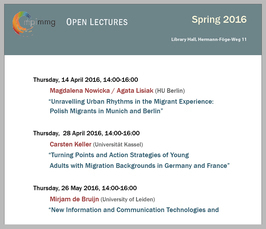"Segregation and Diversity as Multiscalar Phenomena. Why we need multiscale measures to understand neighborhoods and neighborhood effects"
Open Lectures Spring 2016
- Datum: 09.06.2016
- Uhrzeit: 14:00 - 16:00
- Vortragender: Christopher S. Fowler (Penn State University)
- Christopher Fowler is Assistant Professor of Geography and Demography at Penn State University. His research interests are centered on how benefits get distributed when cities spend money with a particular focus on processes of neighborhood change and stability linked to economic development programs.
- Ort: MPI-MMG, Hermann-Föge-Weg 11, Göttingen
- Raum: Library Hall

For more details please contact buethe(at)mmg.mpg.de.
Segregation and diversity are not just opposite ends of a spectrum, but “enfolded” (Holloway et al. 2012) in a way that makes them inextricable. While segregation has significant negative consequences at broad scales (Massey and Denton 1993), it may actually be beneficial at small scales where it is better understood as congregation. Conversely, diversity is understood to be a positive trait at broad scales, but may have negative effects at small scales (Putnam 1993). In contrast, public policy tends to take a ‘one size fits all’ approach; promoting diversity and decrying segregation. Using a case study of ethnically diverse neighborhoods in Seattle, Washington and empirical findings from studies of multiscalar segregation in U.S. cities I argue that we need to represent segregation and diversity in terms of how they vary across scale before we can formulate public policy related to residential settlement patterns. I present some preliminary thoughts on the theoretical framing and methodological tools that might move us towards an understanding and representation of segregation and diversity as multiscalar phenomena.